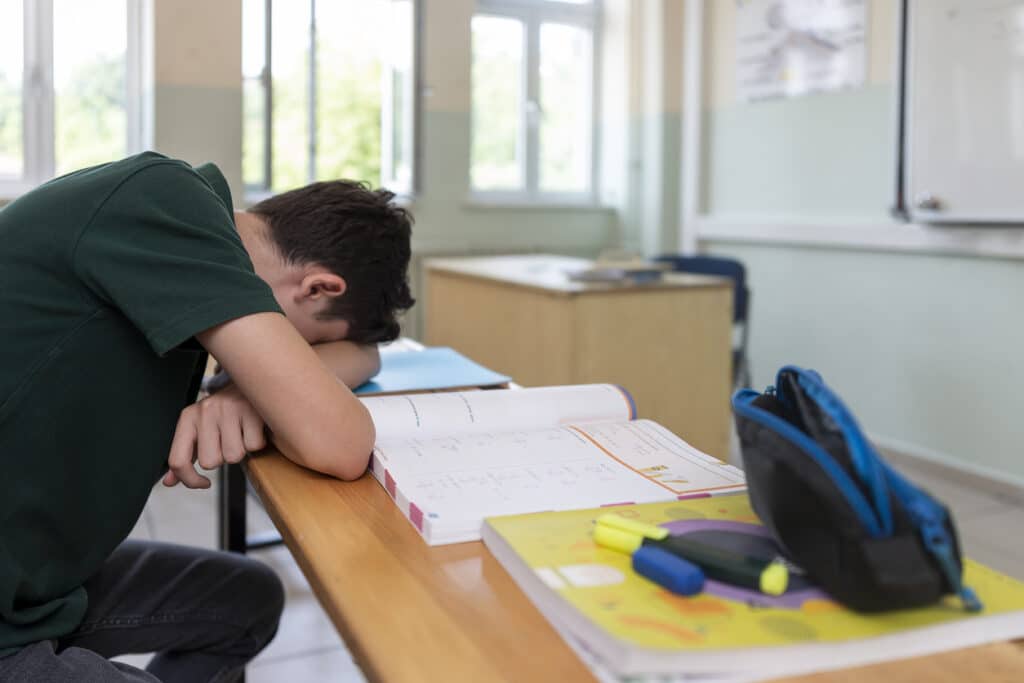More students are struggling with mental health than ever before, and it’s showing up in the classroom. Educators are seeing increased behavioral disruptions, rising absenteeism, and a growing number of students falling behind. These aren’t just discipline issues or academic gaps. They’re warning signs that students need support.
The connection between student mental health and academic performance is clear. When schools address their students’ emotional and behavioral needs, learning improves. When they don’t, the challenges compound.
However, there’s a silver lining. Schools that take a proactive approach to student mental health services see measurable improvements in attendance, behavior, and learning outcomes. Raising mental health awareness emerges as a crucial strategy in combating poor academic performance and fostering a supportive educational environment.

Key Takeaways
- Mental health challenges create barriers to learning
- Behavior often signals unmet emotional or behavioral needs
- Proactive strategies like SEL, PBIS, and strength-based screening improve student outcomes
The Link Between Mental Health and Academic Performance
Mental health and learning are closely connected. When students are overwhelmed, anxious, or depressed, it affects their ability to focus, retain information, and engage in problem-solving.
Brandy Samuell, eLuma’s Director of K–12 Mental Health and Related Services, explains:
“Untreated mental health issues significantly impact cognitive functioning. Students struggling with anxiety or depression often have trouble concentrating, remembering material, and solving problems effectively.”
Research supports this. A study in Social Psychiatry and Psychiatric Epidemiology found that children who show emotional and behavioral difficulties as early as age 3 are more likely to face academic struggles later on. That makes early intervention not just important, but urgent.
Samuell describes the connection between mental health and academics as a cycle:
“If a student struggles with reading, they may feel embarrassed and act out. That leads to disciplinary action or missed class time, which causes them to fall further behind. Their frustration builds, anxiety increases, and eventually the student gives up. The cycle continues unless we interrupt it.”
What Behavior Tells Us About Student Mental Health
Behavioral challenges in the classroom often point to deeper mental health struggles.
Behavior is one of the clearest signals that a student is struggling, but it’s not always easy to read. Some students act out. Others shut down. Both may be signs of deeper mental health challenges.
Cynthia Coufal, a teen anxiety coach and former school counselor, explains:
“Anxiety can show up as outbursts, withdrawal, or aggression. Instead of punishing the behavior, we have to ask what’s behind it.”
Internalizing anxiety and depression and externalizing behaviors are strong predictors of later academic difficulties. These behaviors often include aggression and defiance, reinforcing the importance of recognizing and addressing mental behavioral health early. Proven strategies like social-emotional learning (SEL) programs make a measurable difference.
Coufal continues:
“Schools implementing SEL saw a 32% decrease in aggressive behavior.”
It’s critical that students learn how to regulate emotions and manage stress. When they do, they engage more positively in the classroom and throughout higher education.
Chicago Public Schools demonstrated the power of proactive mental health support. CPC’s case study revealed that schools that provided a welcoming and emotionally safe environment saw improved behavioral health and fewer disruptive behaviors.
CPC schools involved in the study had:
- Improved test scores
- Higher attendance rates
- Fewer disciplinary infractions
- 20% fewer on-campus arrests
These outcomes show that mental health support isn’t a distraction from academics. It’s a driver of academic success.

6 Evidence-Based Strategies to Support Mental Health and Learning
Schools can learn evidence-based mental health strategies and integrate them into daily routines to foster academic self-efficacy.
1. Train Educators to Recognize Early Signs
Teachers don’t need to be mental health experts, but they are often the first to notice when something is wrong. They should know the red flags of mental health struggles and when to refer students for support. Professional development in mental health literacy can help educators recognize red flags and refer students to appropriate support.
2. Create Safe Spaces
Students need spaces where they can regulate their emotions and reset before rejoining the classroom. These can include calming corners, counselor offices, or structured peer support groups. Even small changes, like adjusting seating, can help students feel safer and more focused.
3. Shift from Punitive Discipline to Positive Behavioral Support
When schools focus only on consequences, they risk missing the root of the problem. Schools implementing Positive Behavioral Interventions and Supports (PBIS) help reinforce positive behaviors and teach students the skills they need to manage emotions and navigate conflict.
4. Use Strength-Based Screeners to Identify At-Risk Students
Schools and professionals should use verified and trusted tools like the Devereux Student Strengths Assessment (DESSA). Tools like these help schools pinpoint students needing extra support. Universal screeners focus on resilience and emotional strengths, allowing schools to intervene early and build on what’s working.
5. Leverage Community Partnerships
Schools don’t need to meet student mental health needs alone. Collaborating with local colleges, mental health providers, and community organizations can expand access to care and offer valuable resources to students and families.
6. Integrate Mental Health Strategies Throughout the School Day
Daily routines that include breathing exercises, journaling, and movement breaks help students manage stress and stay engaged. Even simple practices can have a lasting impact.
Coufal shares:
“Even a one-minute breathing exercise before each class period can help students refocus and engage in learning.”

Creating a School Culture Where Students Thrive
Schools that prioritize mental health see measurable improvements across attendance, behavior, and academic performance. When students feel safe, supported, and understood, they show up ready to learn.
It’s not about adding more to your team’s already full plates. It’s about shifting the approach, using tools that work, and building systems that support the whole student.
Partner with eLuma for Mental and Behavioral Health Support
At eLuma, we believe addressing student mental health is essential to improving learning outcomes. We work with schools and districts to deliver online mental and behavioral health services that are flexible, high quality, and tailored to your community’s needs.
Whether your district needs help with therapy, counseling, mental health assessments, or SEL implementation, our team of professionals is here to support your goals. Our services are:
- Accessible for students and families
- Scalable for schools and districts
- Designed to align with your academic and behavioral goals
Let’s build a plan that supports students and strengthens learning. Contact us today.
FAQs: How Student Mental Health and Academic Performance Are Connected
Why is student mental health important for academic success?
Because it affects how students focus, retain information, and solve problems. Addressing emotional needs helps students stay engaged and succeed.
What are signs that a student might be struggling?
Look for changes in behavior, such as withdrawal, aggression, difficulty concentrating, frequent absences, or sudden drops in grades.
How can schools support mental health without adding more work for teachers?
Provide training to help teachers recognize signs of distress, use referral systems, implement schoolwide supports, and bring in external partners. Teachers don’t have to do it alone.
What tools can help identify students who need support?
Use tools like DESSA to identify students early, focus on their strengths, and guide interventions. Combine this with daily practices and community partnerships to build a stronger support system.
About the Experts

Cynthia Coufal is a Teen Anxiety Coach. She has a podcast and YouTube channel called The Teen Anxiety Maze. Cynthia spent 31 years as a teacher and school counselor in Public Schools. She started a podcast during the pandemic to reach her students since she couldn’t see them face to face. This led to her wanting to have a broader audience than just the students in her school building.
Cynthia now has clients around the US and listeners all over the world. Cynthia is YouMap®Assessment Certified. She uses the profile to help young people understand what their strengths, values, preferred skills, and interests are. This helps them find their WHY for tackling anxiety.

Brandy Samuell M. Ed. is a dedicated educator with over 32 years of experience. She has been involved in all facets of public education from classroom teacher to assistant superintendent. Brandy’s knowledge base spans general education, special education, mental health support, and school turnaround. She has experience working in charter, rural, suburban, urban, and virtual school settings. Brandy currently serves as the Director of Mental Health and Related Services at eLuma.
Brandy earned a Bachelor of Business Administration, Marketing, degree from Texas Tech University in 1989, and a Master of Education, School Counseling, degree from Texas Christian University in 2002. She has completed Post-Master’s work in Educational Diagnostics and Educational Leadership from the University of the Southwest. In addition, Brandy is certified in Critical Incident Stress Management; she has managed multiple school-related crises as well as provided crisis management and crisis response training for school staff and community-based first responders.
While Brandy has a broad scope of knowledge and interests, the majority of her career has been dedicated to supporting the emotional and behavioral needs of students as well as managing, coaching, and developing staff. In her spare time, Brandy enjoys being outdoors, spending time with her animals, and working in her yard.



